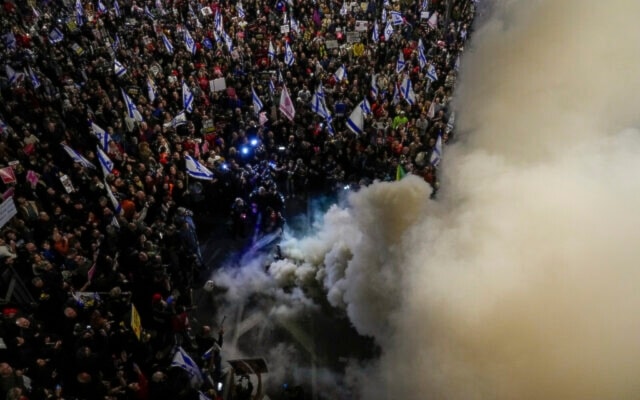Families of Israeli captives urge Biden to push 'Israel' for deal
The families have conveyed their dissatisfaction with what they see as the Israeli government's failure to prioritize finalizing the agreement.
-

Israeli police responded with force, clashing with relatives and supporters of the Israeli captives during a rally calling for their release, in “Tel Aviv”, on March 16, 2024. (AP)
Almost 600 relatives of 81 Israeli captives have called upon US President Joe Biden to urge Israeli Prime Minister Benjamin Netanyahu to negotiate a release deal.
The families conveyed their dissatisfaction with what they see as the Israeli government's failure to prioritize finalizing the agreement. This outreach to Biden, facilitated by "the Hostages and Missing Families Forum," represents the first significant effort by a large number of captives families to engage with the US President on this matter, as reported by The Times of Israel.
🚨🚨🚨Family members of 81 hostages held by Hamas in Gaza sent a letter to President Biden calling him "to use the means available to you, to press and convince all parties, including the Israeli Prime Minister, to agree to the deal that you assess is reasonable" pic.twitter.com/VaArxOkOJF
— Barak Ravid (@BarakRavid) March 22, 2024
“We are increasingly frustrated and concerned by the absence of consistent communication and dedication from the Israeli prime minister and the war cabinet to the cause of freeing hostages,” the letter read.
Russia, China veto inefficient US Gaza ceasefire resolution in UNSC
Russia and China used their veto power on Friday to block a US-drafted Gaza ceasefire resolution at the United Nations Security Council.
The resolution, which fell short of explicitly calling for a ceasefire, faced criticism from both Moscow and Beijing for its perceived shortcomings.
The resolution garnered support from eleven UNSC members, a Sputnik correspondent said, with three opposing it and one abstaining from the vote.
While the draft resolution acknowledged the need for an "immediate and sustained ceasefire" in Gaza, it stopped short of demanding such action.
US resolution refers to Al-Aqsa Flood an 'act of terrorism'
One of the key points of contention was the language of the resolution, which only "determined the imperative" of a ceasefire without issuing a clear mandate.
Additionally, the document expressed support for ongoing diplomatic efforts to secure a ceasefire and called for the release of all remaining captives while also condemning "acts of terrorism," including the Palestinian Resistance's October 7 Operation Al-Aqsa Flood.
Russia, in particular, voiced strong opposition to the resolution, criticizing it for failing to unequivocally call for a ceasefire.
The Russian mission to the UN characterized the document as embodying "past distortions and unacceptable one-sided 'condemnations'," labeling it as "standard American deception."
US has so far blocked all previous resolutions for Gaza
The move from the United States came in due to the international condemnations it is coming under over its lack of a call for a ceasefire, as well as its numerous vetoes of prior ceasefire resolutions that actually explicitly called for a ceasefire.
The US blocked in February a UN Security Council resolution sponsored by Algeria calling for an emergency humanitarian ceasefire in Gaza.
13 members of the UN Security Council voted in favor, while the United Kingdom abstained and the US vetoed the resolution.
The proposed resolution called for "an immediate humanitarian ceasefire that must be respected by all parties."
The resolution also urges all involved in the war to "comply with their obligations under international law," particularly regarding civilians and hostages, in addition to demanding the immediate release of all captives.
Read next: Israeli fibs: What really happened when two captives were retrieved?

 3 Min Read
3 Min Read








